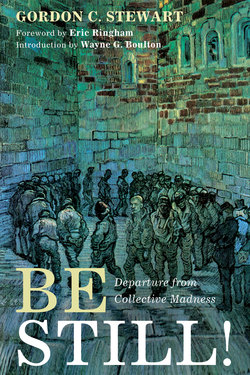Читать книгу Be Still! - Gordon C. Stewart - Страница 17
На сайте Литреса книга снята с продажи.
The Common Ground Beneath the Gun Debate
ОглавлениеWho can endure permanently Plato’s uncertain, unsafe balance on the brink of the abyss of chaos?
—Willem Zuurdeeg18
If ninety-nine percent of reality is perception, analytical philosopher Willem Zuurdeeg argued that perception is the expression of something deeper and far more powerful.
Zuurdeeg, author of An Analytical Philosophy of Religion and Man Before Chaos: Philosophy Is Born in a Cry, spent his life listening to human speech for what lay beneath the surface of the language.
Homo loquens (“man-who-speaks”) is homo convictus (“man-who-is-convicted/convinced”), the creature who establishes her/his finite existence in time by powerful, unshakeable convictors who anchor us against the chaos.
What we often describe as irrational speech, is, in fact, “convictional language,” the hidden power of which can only be understood by a kind of “situational analysis, i.e., the life “situation” (historical-convictional context) of the one who is speaking. Our varying perceptions are determined by the less conscious hidden convictions of implicit needs and unquestioned cultural traditions.
What is missing in the national debate is public expression of the nonrational perceptions of the word “gun” and the unspoken convictions that shape our different perceptions.
We not only hear the word “gun” differently; we hear different things differently.
Until we come together to discuss what we hear when we hear the word—our nonrational (not unrational, as in opposed to reason, but nonrational, as in beneath the presumptions of reason) convictional worlds—the gun debate will be a shouting match that finds no common ground.
A simple exercise of word association demonstrates the difference.
Say the word “gun” and listen for what it evokes in the hearer. In the ears of some, the word means safety and protection. In the ears of others, it means without protection or threat.
But if we listen carefully to the apparently opposite responses, we discover a common ground they share: The threat of insecurity. The threat of chaos.
Whenever we hear a scream, something powerful is under assault. Chaos threatens. We cry out against the chaos. We cry out against death and extinction.
In Man Before Chaos, Zuurdeeg claims that, from its very beginning, Western culture has been bound up with a powerful dread of chaos. Even Plato’s philosophy, argues Zuurdeeg, is born of a cry.
Socrates has died. He himself does not fit very well into Athens’ political life. He is naked and defenseless and is not ashamed of it. He has the courage to cry against chaos and for Being and Goodness. All this has been smothered by the comfortable, although often quarrelsome, classical and medieval philosophy and theology. Who can live by a cry? Who can stand to hear such disturbing noise? Clear and calm reasoning under the guidance of venerable old philosophical schools (or just as respectable church fathers) enables us to live, make church and civilization possible. Who can endure permanently Plato’s uncertain, unsafe balance on the brink of the abyss of chaos? By what does a man live? By a cry? Claims? The careful and broad elaboration of philosophy? All of them?”19
In the current debate about guns, the life situations, cultural traditions, and life experiences of the hearers are “worlds” apart. Perhaps . . . perhaps . . . if we could find the space to listen more deeply to our different cries in the face of chaos, we would find the common ground of homo convictus, and move to something deeper than the shouting.
18. Zuurdeeg, Man Before Chaos, 44.
19. Ibid., 43–44.
